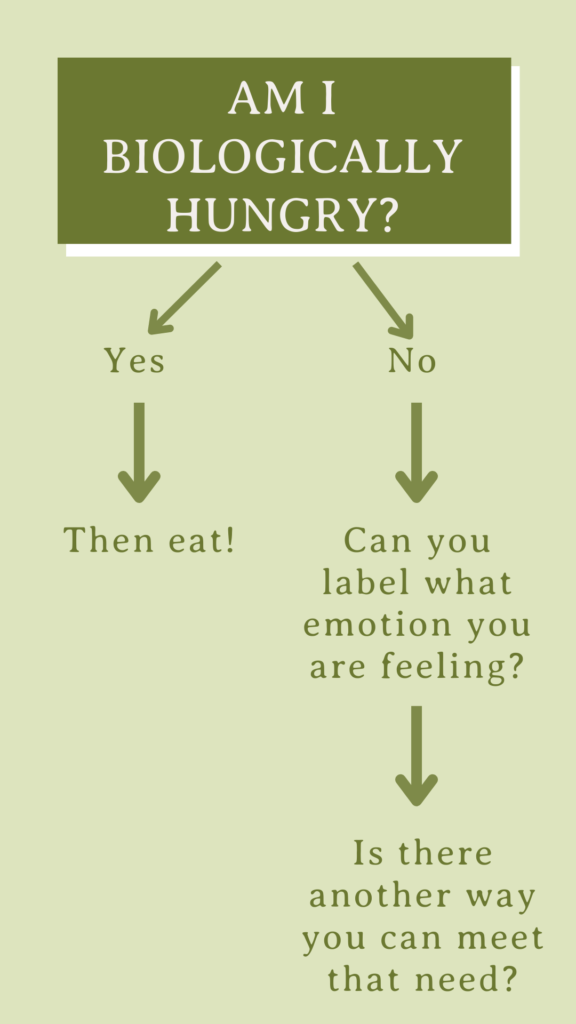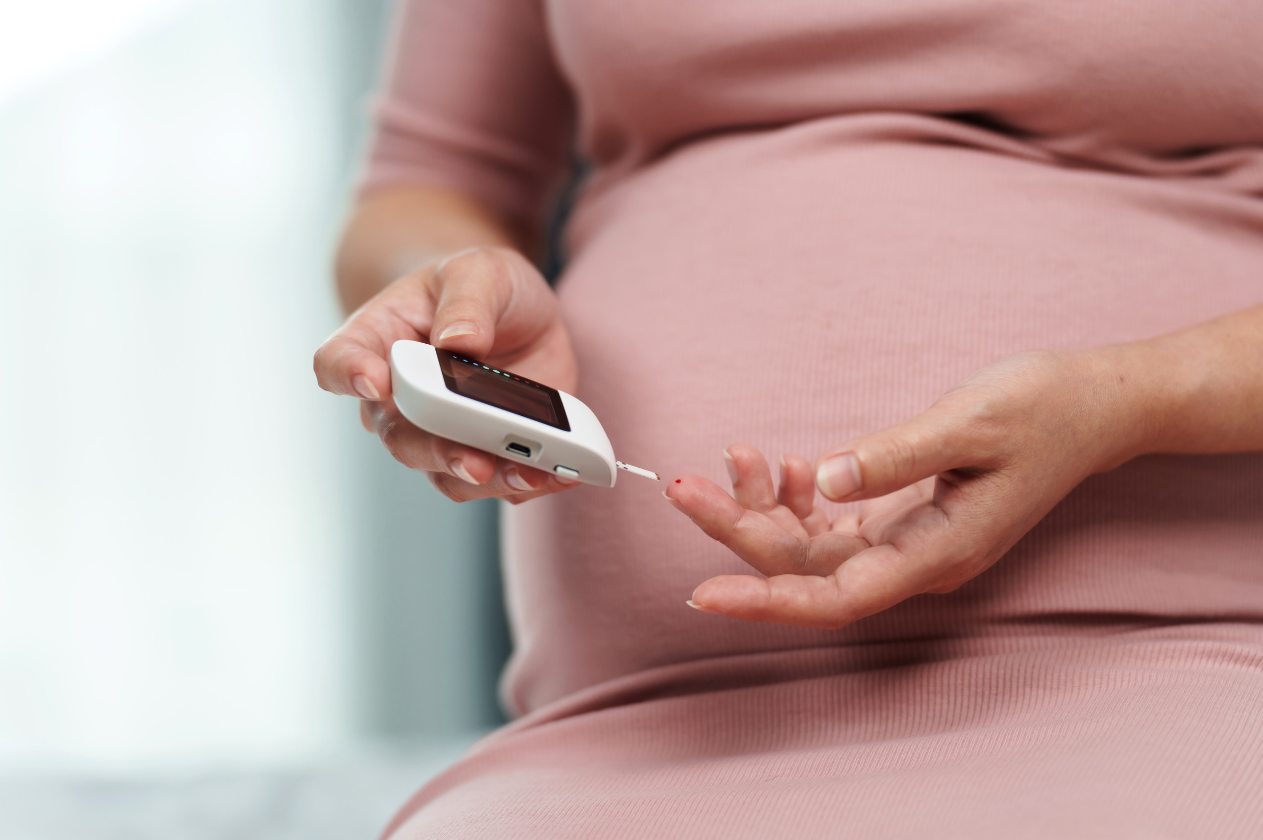Table of Contents
This principle is all about learning how to navigate emotions with kindness and compassion, and is a crucial step towards intuitive eating, even in pregnancy. Emotional eating is something that most people will struggle with in their life, and become a more common occurrence the more that restriction and difficult emotions are involved. Because pregnancy and gestational diabetes can bring up more emotions and feelings than you may typically experience, this Intuitive Eating principle may be especially helpful right now.
But first, it’s important to work through the steps of intuitive eating in order, as many of them build upon each other. If you haven’t already, take a moment to go back and read our recent blog posts on principles #1-#6.
Why people emotionally eat
There are a lot of emotions that can trigger people and cause emotional eating. It’s important to remember that food can bring comfort and distraction, so it makes sense that we turn to it to make us feel “better”. A few emotions that you may realize trigger emotional eating:
- Boredom and procrastination– this is one of the most common triggers for emotional eating. You may reach for food because it’s just something to do or it makes a difficult or boring task more tolerable
- Procrastination– maybe you use food to put off a certain type of work. It gives your brain something else to think about instead of having to focus on the task.
- Excitement– you may be craving more stimulation or want to do something that will bring you some joy
- Bribery– this can look like “if I finish this email then I can eat it” or “if I go to the gym then I can have that food”
- All-or-nothing or “last supper” thinking– You may tell yourself “I’ll just have it all now then start the diet tomorrow” or “I shouldn’t be eating this but I already had one so I’ll eat the rest”
- Self soothing– sometimes it’s okay to turn to food for a little comfort! But if you’re always eating to soothe or you don’t have other ways to cope, you can become disconnected from your body and fullness cues.
- Other emotions that may trigger emotional eating include: love, frustration, anger, rage, anxiety
Note that anxiety and depression is really common in pregnancy and postpartum, so you may be more inclined to emotionally eat to deal with these emotions!
As you can see, emotional eating can be triggered by virtually any emotion, good or bad, and can also bring up a range of emotions. Emotional eating often leads to eating past the point of comfortable fullness and may bring up feelings of guilt or shame after eating “so much”. It’s helpful to approach these situations with compassion and not judgment. Try to get curious about the last time you may have emotionally eaten. Can you point it back to a specific emotion you were feeling?
Eating can turn into emotional eating when there is no biological hunger involved (to learn more about hunger and signs of physical hunger read this blog post).
Is emotional eating bad?
To put it simply, no- emotional eating is not bad. Food is a source of comfort, joy, and connection. There’s a reason we have dinner parties, people bring food when a baby is born, and food is provided when a family member passes. As you start to navigate emotional eating and better understand your own habits and behaviors it’s important to remember that a big part of becoming an intuitive eating is having self-compassion and recognizing that it’s okay if you’ve been using food to cope.
It’s also okay if you aren’t at a place where you’re able to deal with that right now. But if you are and you feel emotional eating may be hurting you in some way (emotionally, mentally, physically), then keep reading!
What should you do if you’re emotionally eating?
First things first- if you are biologically hungry then you should eat! If you’re not biologically hungry then start to get curious. You can use this chart a a guide:

Healthy coping allows us to feel our full range of emotions and deal with them in a productive way. Emotional eating may numb our feelings.
Other ways to cope with these emotions may include:
- Connection with other people you might need
- A different way to release your stress such as movement, deep breathing or a good cry
- To talk to a therapist
- Getting more sleep
- Bringing in more help or support around the house, at work, or with family
- To feel loved and accepted
Sometimes dealing with your emotional eating is less about dealing with the eating itself and more about meeting other needs in your life. Rather than trying to strictly manage and control the eating (especially if you find that you’re overeating from emotional eating) it might be more helpful to focus on a different area of your health. As you do that, your relationship with food may begin to heal as a byproduct.
If you’re looking for other ways to expand your “toolbox” and practice more self-care, check out our Health Wheel resource here. This 14-page resource helps you take inventory of your current health and wellbeing. Then it guides you in designing an individualized plan forward.
Know that there is no right or wrong way to deal with your emotions. You may need to yell, cry, go for a walk, and sometimes you may need to eat.
Even if you recognize you are emotionally eating, be compassionate with yourself. Eating can be one of the tools in your toolbox, we just don’t want it to be the only tool.
CHALLENGE: Next time you are starting to strongly feel an emotion, before you turn to food try to take note of where the feeling is showing up in your body. For example, if you’re anxious you may feel it in your stomach. If you’re sad you may feel it in your chest. Then, make note of how this sensation feels. Is it pleasant? Unpleasant? Neutral? Really connecting to these physical sensations in your body will allow you to connect to the feelings later on, possibly when you’re able to process and deal with them.
If you’re looking for more guidance, I recommend the book “Burnout: The Secret to Unlocking the Stress Cycle” by Emily Nagoski and Amelia Nagoski to learn more about how to recognize and deal with stress. They talk about the stress cycle and our need to complete the cycle in order to allow our bodies to move forward. Guess what? Eating isn’t one of the ways our bodies process stress in our body effectively.
Navigating emotions in pregnancy
As mentioned, pregnancy and gestational diabetes can bring up a range of emotions like anger, disappointment, frustration, shame, guilt.
It’s important to apply the tools and strategies above, but also know that it’s okay if you need more support. There are many great therapists that focus on prenatal and postpartum transitions (you can start your search on findapsychologist.org or ask if your doctor has a local reference!)
Remember that it’s normal to eat for so many reasons, some emotional, some physical, sometimes both. But if emotional eating feels like a problem for you, getting support from a dietitian or therapist can be transformative.
As a gestational diabetes dietitian and doula I would love to support you and help you establish a better relationship with food and your body, that you can pass down to your children as well! To learn more about this intuitive eating principle, my services, and how I can help, book a free consultation call with me here.




 Hi! I’m Emily.
Hi! I’m Emily.

thanks you, this is very encouraging and helpful. taking many notes